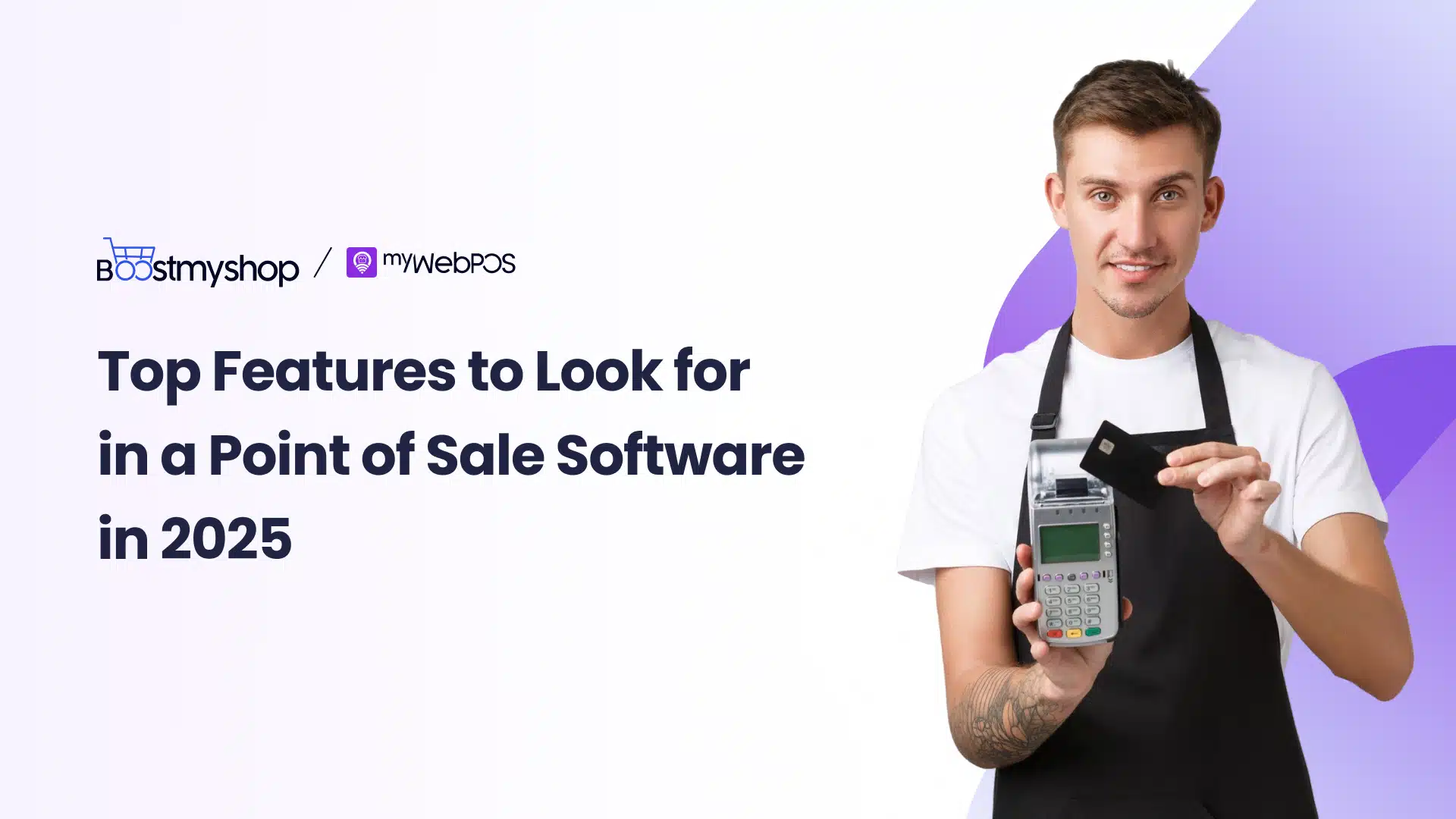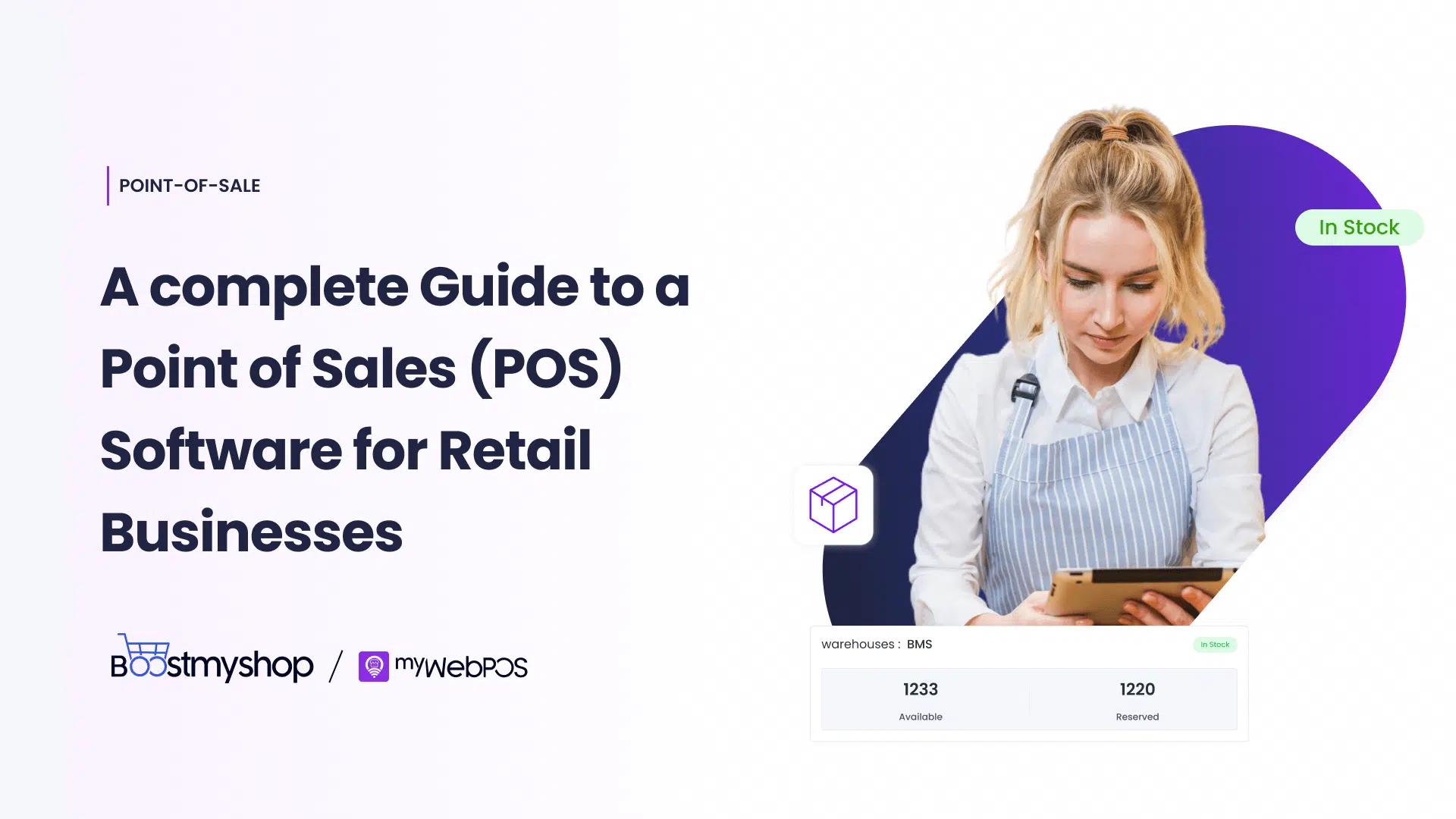How a POS System Can Streamline Retail Operations
Introduction
A modern POS system for retail is a game-changer for businesses looking to improve efficiency, streamline operations, and enhance the customer experience. Whether you’re a small retailer or managing multiple store locations, adopting a robust retail POS system can simplify processes, boost productivity, and provide valuable insights into your business.
What is a POS System for Retail?
Point-of-sale (POS) software is an all-in-one solution designed to streamline your business operations. It enables payment processing, customer information management, inventory updates, and helps foster customer loyalty. Whether you’re running a brick-and-mortar store, a retail business, an online shop, or a restaurant chain, a modern POS system empowers you to meet your business goals while enhancing the customer experience.
In recent years, many businesses have shifted towards modern software or ERP solutions that include integrated or fully connected POS systems. This unified approach offers easy access to data, improved connectivity, seamless day-to-day operations, and an exceptional customer experience, all while embracing cutting-edge technology to elevate your POS strategy.
How a POS System Can Streamline Inventory Management?
Traditional methods of tracking sales and managing business operations-like cash registers, manual accounting, and bookkeeping-are quickly becoming outdated. In today’s fast-paced market, businesses need to adapt to the new normal, which includes contactless billing, e-commerce, customer loyalty programs, omnichannel retail, and efficient delivery systems. The POS software, like Boostmyshop’s MyWebPOS, offers more than just basic functionality. It provides a range of features that automate sales, streamline inventory management, and enhance operational efficiency.
Choosing the right POS solution can be overwhelming, given the sheer number of options available. However, with MyWebPOS, you can be confident in selecting a robust and user-friendly system tailored to meet your business’s needs.
Let’s figure out how?
Enhanced Efficiency
One of the primary benefits of adopting a POS system for retail is the significant improvement in operational efficiency. Traditional retail methods often involve manual processes that are time-consuming and prone to human error. A modern retail POS system automates many of these tasks, such as order processing, inventory updates, and sales tracking. This automation reduces the workload on employees and allows them to focus on more strategic tasks, such as customer service and business growth.
According to a McKinsey report, businesses implementing advanced POS solutions experience a 20% increase in operational efficiency. By automating everyday tasks, POS solutions help retailers optimize their workflows and enhance overall productivity.
Streamline Real-time Inventory Management
One of the most significant challenges in retail operations is managing inventory effectively. Traditional methods often lead to excess stock or stockouts, which can result in lost sales or unnecessary holding costs. Modern retail POS systems address these issues by providing real-time inventory tracking.
With a POS system for retail, businesses can monitor inventory levels in real time, ensuring they always have the right amount of stock on hand. According to Fortune Business Insights, businesses using advanced POS solutions experience a 25% reduction in excess inventory and a 30% reduction in stockouts. This helps retailers minimize waste, reduce costs, and avoid missed sales opportunities.
Data-Driven Decision-Making Solutions
One of the most powerful features of modern retail POS systems is their ability to collect and analyze vast amounts of transactional data. By leveraging this data, retailers can make informed decisions that drive profitability and improve customer experience.
A Harvard Business Review survey found that 73% of businesses using data analytics through their POS solutions reported improved decision-making. With access to customer purchasing history, sales patterns, and inventory trends, retailers can tailor marketing strategies, optimize product offerings, and ensure they are meeting customer demands.
Advanced Automation
Automation is another key feature of POS solutions that can significantly streamline retail operations. Modern retail POS systems automate various processes such as order processing, customer feedback collection, and inventory updates. This reduces the time spent on manual tasks, which can otherwise slow down operations.
For instance, automated stock replenishment ensures that inventory levels are consistently updated, and items that are running low are reordered without any manual intervention. This ensures that retailers never run out of popular items and can avoid overstocking on products that aren’t performing well.
Analytics and Reporting
A retail POS system provides in-depth reporting and analytics that can help businesses track their performance and identify areas for improvement. These insights can cover everything from sales data and inventory turnover to customer preferences and purchasing patterns. By analyzing these metrics, businesses can optimize their sales strategies, adjust pricing models, and even make decisions about staffing.
Having access to real-time data through advanced POS solutions enables retailers to stay ahead of the competition and make smarter, data-driven decisions. This is critical in today’s fast-paced retail environment, where trends change quickly, and customer expectations are constantly evolving.
Seamless Integration Between Online and In-Store Sales
Many retailers today operate both physical stores and e-commerce platforms. However, managing both channels separately can lead to inconsistencies in sales data and inventory levels. Modern retail POS systems support shared commerce, which allows for seamless integration between your online store and physical retail locations.
With POS solutions that share the same database, retailers can easily track sales, manage inventory, and generate reports across multiple channels. This unified approach ensures consistency and eliminates the need for manual data entry, reducing errors and saving time.
Adaptability and Scalability
As your business grows, so do your operational needs. Modern POS solutions are designed to be adaptable and scalable, allowing you to add new features or expand your system as needed. Whether you’re opening new locations or launching an online store, a retail POS system can grow with you, ensuring that it continues to meet your business’s needs.
This scalability is essential for retailers who want to future-proof their operations. By choosing a POS system for retail that offers flexibility and the ability to add functionalities, businesses can ensure that they are prepared for growth and change.
Mobile POS:
Mobile POS systems have revolutionized how retailers process payments. With mobile POS, retailers can turn any internet-connected device into a portable payment processing system. This is especially useful for businesses that need to accept payments on the go, such as pop-up shops, outdoor markets, or food trucks.
Mobile POS allows retailers to offer a seamless payment experience for customers, regardless of location. It also supports a range of card transactions that may not be possible with traditional POS systems.
Improved Customer Experience
In today’s competitive retail environment, providing an exceptional customer experience is more important than ever. A POS system for retail can enhance the customer experience by providing real-time data that supports quicker decision-making.
With integrated POS and ERP solutions, businesses can respond more effectively to customer demands, improving the overall shopping experience. Whether it’s offering personalized recommendations based on purchase history or providing a more efficient checkout process, modern POS solutions help retailers meet customer expectations and build loyalty.
Why Choose myWebPOS for Retail with myFulfillment?
When it comes to managing inventory, myWebPOS paired with myFulfillment offers a comprehensive solution that streamlines your retail operations. myWebPOS simplifies retail transactions with features like rapid cart creation, flexible payment options, and efficient return management-all integrated seamlessly with your inventory system. This ensures that your sales operations run smoothly while providing real-time updates across all locations, keeping stock levels accurate and optimizing order fulfillment whether online or in-store.
Moreover, with flexible fulfillment options such as “Buy Now, Ship Later” or “Online Purchase, In-Store Pickup,” myWebPOS adapts to your specific business model, boosting customer satisfaction and driving more sales. When integrated with myFulfillment, myWebPOS takes inventory management to the next level. This powerful combination offers unified management of sales, inventory, and fulfillment, ensuring smooth, scalable growth as your business expands. Plus, with simplified multi-store management, you can effortlessly handle orders and stock across multiple locations, preventing stockouts or overstock issues, and keeping operations running efficiently at every level.
Choosing the Right POS System for Your Retail Business
Selecting the right POS system for your retail business is crucial to streamlining operations, improving efficiency, and enhancing the customer experience. With numerous options available, it’s essential to understand what features and factors are most important for your unique business needs. Here’s how you can make an informed decision when choosing a POS system for retail, ensuring it meets your objectives and supports your long-term growth.
Key Features to Look for in a POS Solution
When evaluating retail POS systems, it’s important to prioritize features that will directly benefit your operations and customers. Some key features to consider include:
- Inventory Management: A strong POS solution should provide real-time updates on inventory levels, enabling you to track stock across multiple locations, reduce stockouts, and optimize stock levels to avoid overstocking. This is especially important for managing both online and in-store inventory.
- Sales Reporting and Analytics: Look for a POS system that offers comprehensive reporting features, such as sales data, customer trends, and performance analysis. These insights will help you make data-driven decisions, optimize product offerings, and create targeted marketing campaigns.
- Customer Relationship Management (CRM): A good retail POS system should allow you to collect and store customer information, enabling you to personalize the shopping experience, send promotions, and build customer loyalty through rewards and incentives.
- Omnichannel Integration: With the rise of online and brick-and-mortar shopping, an omnichannel POS system is essential. Ensure your POS solution can seamlessly integrate with e-commerce platforms and handle in-store and online transactions effortlessly.
- Mobile POS Capabilities: If you plan to have a flexible and portable checkout experience, make sure the POS system has mobile capabilities that allow you to process transactions from any location, improving customer service and increasing sales opportunities.
- Payment Processing: The POS system should support various payment methods, including credit/debit cards, contactless payments, and mobile wallets, allowing for quick and secure transactions.
How to Evaluate POS Systems for Retail Efficiency
- Ease of Use: A complex system can slow down your operations and hinder employee productivity. Look for a user-friendly interface that minimizes the learning curve and helps your team get up and running quickly.
- Customer Support: Ensure the POS provider offers reliable customer support, with access to technical assistance when needed. A responsive support team is essential for resolving any issues that may arise during your operations.
- Speed and Performance: A slow POS system can negatively impact your customer experience and employee efficiency. Choose a system that can process transactions quickly, even during peak hours, without lag or downtime.
- Automation Features: Automation is key to streamlining retail operations. Look for systems that automate inventory management, sales tracking, and reporting, freeing up time for you to focus on growing your business.
Factors to Consider: Cost, Scalability, and Support
When selecting a POS solution, there are several important factors beyond just features to consider:
- Cost: The initial cost of the system, as well as ongoing fees (such as transaction fees, subscription costs, or maintenance), should fit within your budget. Be sure to factor in any hidden costs, including hardware or software upgrades. A more affordable solution like Boostmyshop’s MyWebPOS can provide great value without sacrificing performance.
- Scalability: As your business grows, your POS system should be able to scale with it. Whether you’re opening new locations, expanding your product range, or increasing your sales channels, ensure the system can handle your evolving needs without requiring a complete overhaul.
- Support: A good POS provider should offer excellent customer support, including troubleshooting, system updates, and training. Make sure the provider offers 24/7 support or at least reliable access to assistance when needed.
Conclusion
Choosing the right retail POS system is a strategic decision that will impact your business efficiency, customer experience, and bottom line. By considering key features like inventory management, reporting capabilities, and integration with your sales channels, you can ensure your POS solution meets your business’s needs. Additionally, evaluating cost, scalability, and support options will ensure that your investment pays off in the long term.
At Boostmyshop, we offer MyWebPOS, a solution designed to streamline retail operations, enhance customer experiences, and drive business growth.




